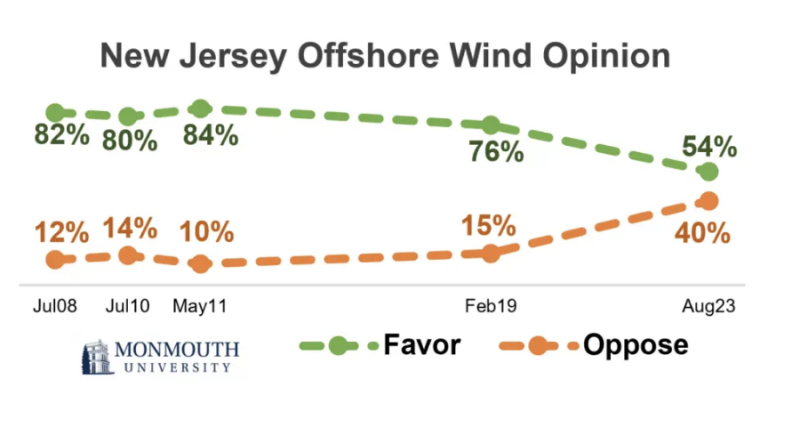A new Monmouth University Poll finds that public support for New Jersey offshore wind projects has dropped sharply, with 54 percent of respondents in favor – down from 76 percent the poll reported in 2019.
The decline comes after a long drumbeat of public debate over how the future seaside vista of turbine arrays visible off Jersey Shore resorts could affect the region’s summer tourist economy.
Those arguments heated up with a wave of whale strandings on New Jersey and New York beaches starting in December 2022. Offshore wind opponents tied the deaths to vessels conducting surveys on wind power sites.
Federal agencies insist there is no evidence to link the projects to stranded whales, while marine mammal rescue groups found evidence that dead humpback whales were injured by ship strikes.
Now a majority of New Jersey residents still favor developing offshore wind power, but those numbers are far below what Monmouth University pollsters have found as recently as 2019.
“Four in 10 residents think wind farms could hurt the state’s summer tourism economy and just under half see a connection between wind energy development and the recent spate of whales washing up on New Jersey beaches,” according to a summary from the Monmouth University Poll. “Few see wind energy leading to major job growth in the state.”
The split is 54 percent in favor of offshore wind power and 40 percent opposed. It’s a sharp contrast to early optimism about wind energy for New Jersey, when in 2019 support was at 76 percent with 15 percent opposed.
“There was a time when wind energy was not really a political issue. It consistently received widespread bipartisan support for more than a decade. That is no longer the case,” said Patrick Murray, director of the independent Monmouth University Polling Institute.
The debate has taken a sharply partisan cast, with 56 percent of Republicans saying wind energy will hurt shore tourism, compared with 41 percent of independents and just 24 percent of Democrats who agree, according to the poll results.
Just 9 percent think that offshore wind will help tourism, while 44 percent say it will have no impact. There is skepticism too about wind power boosters’ predictions for new jobs from the wind power industry, with just 22 percent seeing job growth potential, 55 percent expecting a few and 15 percent foreseeing none.
Concern over whale strandings has raised doubts about offshore wind projects, with just under half of those polled thinking that wind survey work could be a factor – 20 percent thinking it is definitely related, and 25 percent believing it could be likely.
Broken down by political affiliation, those feelings too show a strong partisan influence according to the poll.
Republicans at 63 percent are much more likely than Democrats with 26 percent to believe that wind energy development is definitely or probably playing a role in whale beachings.
“Opinion on the beached whale phenomenon has a high correlation with support for wind energy. Among New Jerseyans who see a connection between the two, just 29 percent favor offshore wind energy development,” according to pollsters. “Among those who feel these things are not related, 76 percent support wind energy.”
“Changing the status quo is very hard, and the state has set some very ambitious goals to move to more renewable energy sources and reduce fossil fuel emissions. It is not surprising that more local concerns are getting raised as plans for offshore wind advance. Clearly the state and wind industry have to do a much better job in reaching out to communities to demonstrate the economic and environmental benefits of these projects, as well as to counter misinformation about threats to tourism and threats to whales,” said Tony MacDonald, director of the Urban Coast Institute at Monmouth University.
The partisan shift has led to striking differences too in how the New Jersey public views offshore drilling for oil and nuclear energy.
“New Jersey Republicans give majority support to both offshore drilling (63 percent) and nuclear energy (53 percent). In 2019, just under half of this group supported fossil fuel exploration (48 percent) and even fewer supported nuclear energy (31 percent),” the Monmouth pollsters report.
“Fewer than 3 in 10 Democrats support either oil drilling (25 percent) or nuclear energy construction (29 percent), but even these low numbers are between 6 and 7 points higher than they were in 2019.
“Interestingly, among New Jerseyans who specifically believe offshore wind farms would hurt summer tourism down the shore, just 23 percent support wind energy development but more than twice as many (49 percent) favor drilling for fossil fuels off the state’s coast.”







.jpg.small.400x400.jpg)